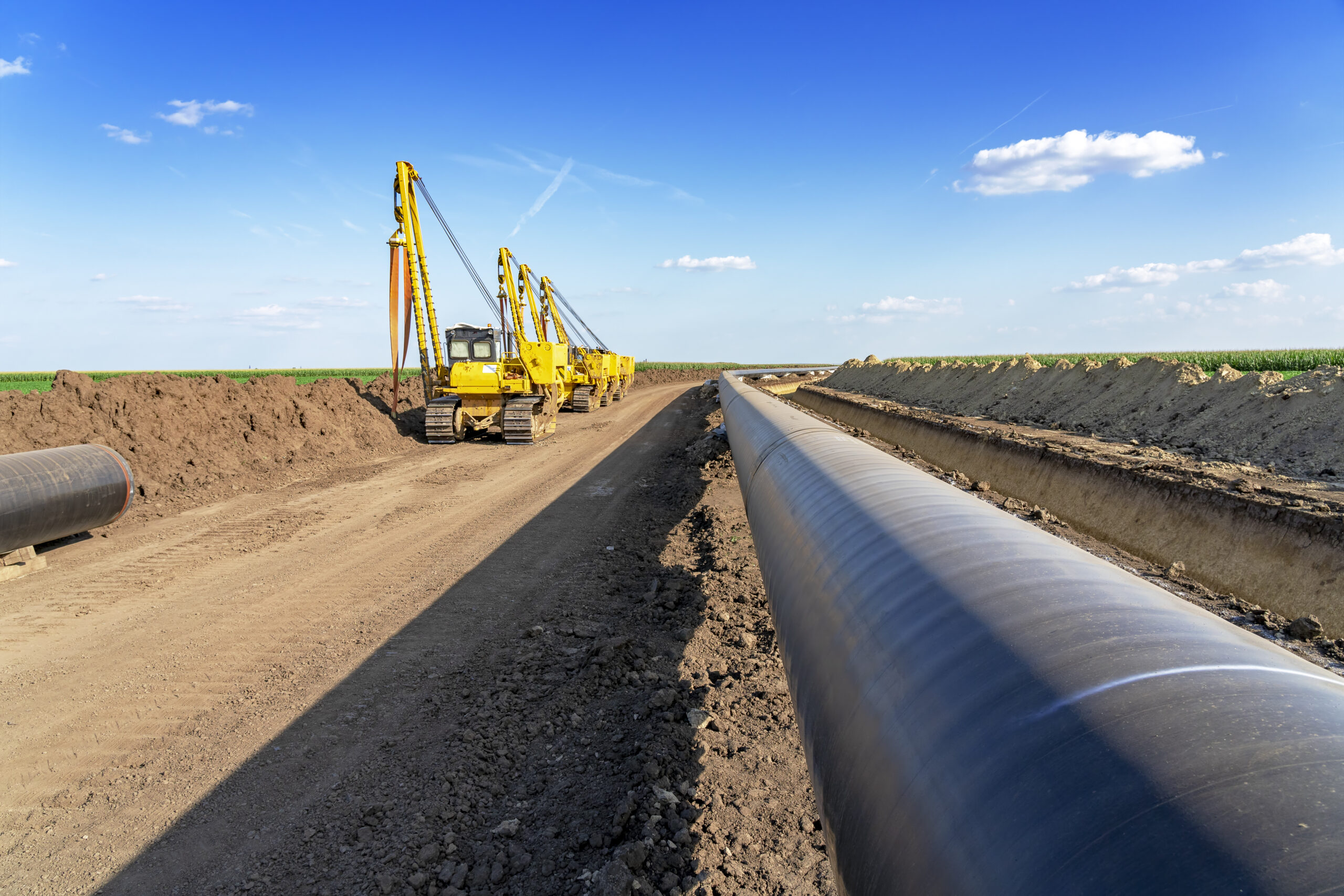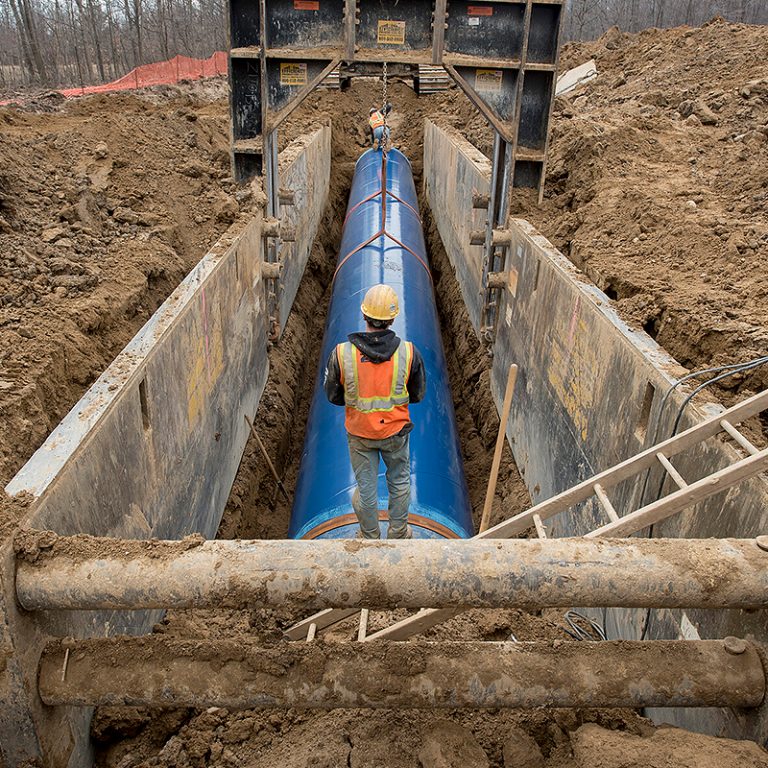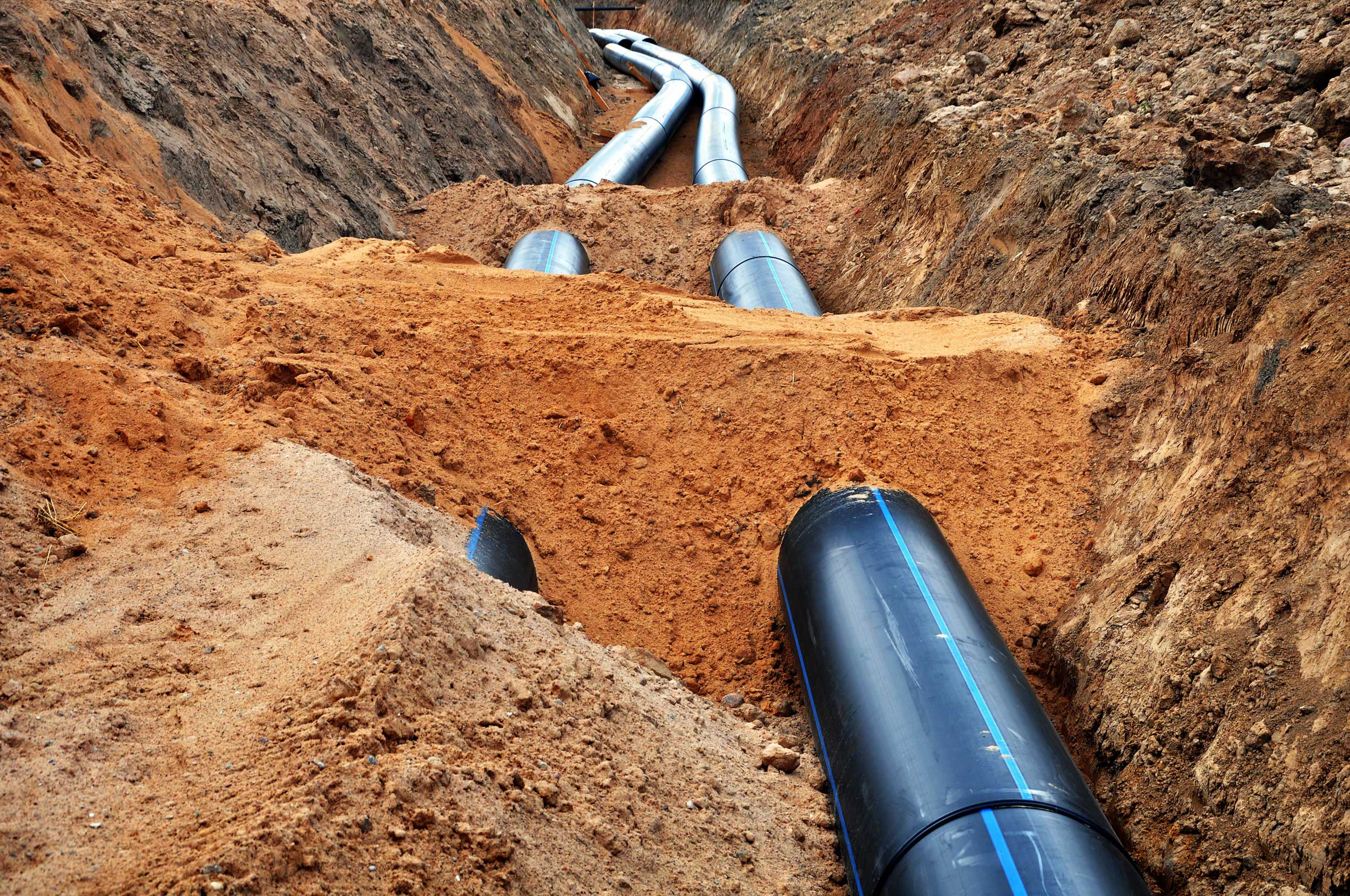Why Pipeline Construction Is Important for Energy Facilities Advancement
Pipeline construction plays an important role in the growth of power framework, serving as the backbone for the transportation of vital sources like oil and all-natural gas. This intricate network not only promotes efficient circulation however additionally bolsters financial development with task creation and neighborhood financial investment. Additionally, developments in security modern technologies are addressing environmental concerns, positioning pipelines as a cornerstone of sustainable energy techniques. Nonetheless, the intricacies surrounding pipe jobs raise critical concerns about regulative structures and their long-term influence on communities and ecosystems. Checking out these measurements reveals a diverse story that warrants cautious factor to consider.
Duty of Pipelines in Energy Supply
The essential duty of pipelines in energy supply can not be overstated, as they function as the backbone of modern-day energy framework. Pipelines are vital for the efficient transportation of numerous forms of power, including oil, gas, and improved items. They help with the motion of these resources from removal websites to refineries and warehouse, making certain that power reaches customers in a timely manner.The construction of pipelines includes precise preparation and adherence to regulatory criteria, showing the intricacies of the power market and environmental considerations. Effective pipeline networks are designed to decrease transit times, reduce expenses, and boost security, while additionally attending to possible ecological impacts. The capability to deliver large quantities of energy over cross countries makes pipelines a favored choice for energy firms wanting to maximize their supply chains.Moreover, pipelines contribute to energy security by expanding supply routes and sources. As global energy demands rise and fall, pipelines make it possible for regions to access various power supplies, mitigating threats connected with dependence on single sources. This diversification promotes affordable prices and stabilizes markets, which is crucial in an increasingly interconnected global economy.In enhancement to their logistical benefits, pipelines sustain regional economies by producing jobs during construction and maintenance phases. The presence of a durable pipeline framework also brings in investments in energy tasks, additionally improving regional advancement. Ultimately, pipelines are vital to the energy market, providing a trusted and reliable means of transport that underpins economic growth and sustainability.

Advantages of Reliable Transportation
Reliable transportation through pipe systems supplies substantial advantages, including lowered transport prices and boosted distribution rate. These advantages not only boost the total economics of energy circulation yet likewise play a crucial role in lessening the ecological effect connected with energy transport. As energy demands proceed to increase, the importance of maximizing transportation methods ends up being progressively obvious.

Minimized Transport Expenses
Decreased transport prices stand for a remarkable benefit in the domain name of power infrastructure advancement. The construction of pipelines provides a more economically viable means of carrying energy sources contrasted to alternate techniques such as trucking or rail transportation. Pipelines, when developed, permit the continuous circulation of oil, gas, and other items over fars away with marginal functional costs.One of the primary reasons for reduced transport expenses is the efficiency of pipeline systems. They can transfer huge quantities of products simultaneously, consequently spreading out dealt with costs over a better quantity of item. This mass transport capability notably decreases the expense per device, making energy sources a lot more cost effective for customers and services alike.Additionally, pipelines minimize the dangers and prices related to handling and saving unstable products. Unlike rail or road transportation, which can incur delays and damage, pipelines offer a much safer and much more constant approach of power transportation. This reliability boosts the economic feasibility of energy jobs, allowing for far better prices frameworks in affordable markets. Inevitably, minimized transportation expenses promote an even more sustainable energy market, promoting larger access and motivating financial investment in additional advancement.
Improved Distribution Speed
Pipelines substantially improve shipment rate in energy transportation, using a vital benefit over conventional techniques such as trucking or rail systems. The continual circulation of materials with pipelines enables a constant and reliable transportation procedure, decreasing hold-ups linked with loading and dumping. This constant movement is especially important for energy resources, where need can fluctuate rapidly.Moreover, pipelines can run around the clock, unaffected by website traffic conditions or weather-related disruptions that can restrain road or rail transportation. This reliability assures that energy products get to consumers swiftly, sustaining operational demands and reinforcing economic stability. On top of that, the scalability of pipe systems facilitates the handling of huge volumes of energy, which is crucial for satisfying the growing needs of sectors and residential sectors.Furthermore, the integration of sophisticated monitoring and control technologies in pipe systems improves the distribution process. These technologies enable real-time monitoring of flow rates and system stress, guaranteeing that any kind of possible issues are resolved without delay. On the whole, the boosted distribution speed given by pipelines is a significant consider maximizing power framework and guaranteeing that supply chains continue to be durable and responsive to market needs.
Ecological Influence Considerations
The advantages of speedy energy transport extend beyond logistical advantages; they also include substantial ecological considerations. Reliable pipe systems permit the transport of energy resources with marginal interruption to ecological communities compared to alternative approaches such as truck or rail transport. Pipelines can help with the motion of oil, gas, and other materials in an extremely concentrated manner, which reduces the carbon impact associated with energy distribution.Moreover, pipelines are made with advanced safety and surveillance modern technologies that considerably reduced the danger of spills and leaks. An effective pipeline facilities decreases the demand for constant transportation tasks, which can bring about minimized greenhouse gas discharges gradually (Professional Oilfield Services Texas). The capacity to carry energy sources straight to consumers reduces dependence on even more contaminating transportation methods, even more benefiting air quality.In enhancement, critical pipeline placement can aid preserve delicate environments by adhering to existing passages, thereby reducing the effect on wildlife and natural landscapes. On the whole, the construction of pipelines not just supports energy facilities development however likewise provides an environmentally accountable methods of carrying energy, adding to a much more lasting future
Economic Influence of Pipeline Projects
The economic effect of pipe jobs expands past mere transportation efficiency, substantially affecting neighborhood and local economic situations. These initiatives develop job chances throughout both construction and ongoing procedures, cultivating neighborhood advancement (Pipeline Construction Authority). In addition, the excitement of economic growth with boosted investment and facilities enhancement is a crucial advantage of pipeline construction
Task Development Opportunities
While energy infrastructure jobs frequently face analysis, they provide significant job production opportunities that can favorably influence local economies. Pipeline construction jobs call for a diverse series of experienced labor, including engineers, task supervisors, and specialized professionals, in addition to unskilled laborers for numerous duties. This multifaceted need for labor can result in the production of countless work throughout the construction stage and commonly causes long-lasting job opportunity once the infrastructure is operational.In enhancement to direct employment, pipe jobs boost neighborhood economies by producing supplementary task chances in industries such as transport, manufacturing, and hospitality. Regional organizations gain from increased demand for goods and services, adding to total economic wellness. Furthermore, the increase of employees can cause increased tax obligation earnings for neighborhood governments, which can be reinvested in community services and infrastructure.Moreover, pipe construction tasks frequently focus on hiring regional employees, cultivating a feeling of neighborhood investment and support. By bridging the gap in between power supply and need, these projects not only boost energy safety and security yet additionally work as stimulants for financial development, strengthening the value of pipe construction in work development efforts.
Economic Development Stimulation
Pipeline projects act as an effective financial growth stimulation, driving significant investments into regional and local economies. The construction and operation of pipelines develop a surge effect, generating need for products, tools, and services (Midland Pipeline Construction Authority). This influx of funding supports neighborhood organizations, from producing to friendliness, promoting a robust economic environment.Moreover, these jobs create substantial tax revenues for districts and states, which can be reinvested in public solutions, facilities renovations, and community growth campaigns. The financial advantages extend past immediate job creation, as experienced labor is often needed for ongoing maintenance and operations, making sure lasting employment opportunities.Additionally, the enhanced energy infrastructure facilitates the efficient transportation of sources, potentially decreasing power prices for customers and services alike. By boosting power availability, pipelines can attract new markets and boost growth in existing industries, adding to total financial diversification
Environmental Considerations and Innovations
Balancing energy requires with environmental stability becomes significantly crucial as pipeline construction increases. The pursuit of reliable energy transportation must account for environmental influences, requiring innovative practices and technologies that minimize environmental disturbance. Modern pipe projects are significantly incorporating advanced environmental evaluations at every phase, making certain that possible dangers are determined and reduced early in the preparation process.One notable advancement in this field is the adoption of trenchless innovation, which enables for the setup of pipelines without extensive surface area disruption. This technique decreases environment fragmentation, protects existing ecosystems, and lessens the carbon impact related to conventional excavation techniques. In addition, real-time tracking systems equipped with sensing units make it possible for operators to detect leaks or environmental modifications promptly, thereby promoting prompt feedbacks to prospective hazards.Moreover, the incorporation of eco-friendly materials and construction methods is obtaining grip. Biodegradable drilling liquids and corrosion-resistant coverings can greatly minimize the environmental impact of pipe tasks. Companies are also committing to restoring environments post-construction, using native plant types to aid in ecological community recovery.Collaboration with ecological companies and local neighborhoods is crucial - Pipeline Construction Authority. Engaging stakeholders in the decision-making procedure promotes openness and advertises sustainable techniques, making certain that energy infrastructure development lines up with environmental stewardship
Difficulties in Pipeline Construction
In the middle of the growing demand for power facilities, different challenges complicate the construction of pipelines. One of the main concerns is the geographical variability of pipeline paths, which can traverse diverse landscapes, consisting of hills, rivers, and city areas. Each setup requires customized design remedies to resolve environmental management, geological security, and logistical constraints.Additionally, the general public perception of pipe jobs often positions a considerable obstacle. Local communities might reveal issues regarding possible ecological impacts, safety threats, and disruption throughout construction. This opposition can result in delays, enhanced prices, and the necessity for substantial neighborhood interaction strategies to promote acceptance.Moreover, labor shortages in experienced trades further complicate pipeline construction efforts. As the need for energy infrastructure expands, the availability of seasoned workers diminishes, which can bring about task delays and boosted labor costs. The pipe sector need to buy workforce advancement initiatives to grow a proficient labor force efficient in meeting the advancing demands.Safety stays a vital concern throughout the construction procedure. The market encounters the obstacle of making certain that all safety procedures are abided by, as even small lapses can lead to significant accidents. This necessitates extensive training and oversight to preserve functional integrity.Lastly, fluctuating material prices can affect job spending plans and timelines. The requirement for top quality products, coupled with market volatility, calls for careful economic preparation and risk reduction approaches to keep jobs on course. Resolving these challenges is vital for the successful and reliable construction of pipelines as part of a durable energy framework.
Regulative Framework and Conformity
The regulative framework controling pipeline construction is intricate and multifaceted, needing conformity with a selection of federal, state, and regional laws. At the government level, companies such as the Federal Energy Regulatory Commission (FERC) and the Pipeline and Hazardous Materials Safety Administration (PHMSA) play critical duties in supervising pipe jobs. FERC controls the transport of gas and oil, accepting projects based upon financial need and public rate of interest, while PHMSA focuses on security requirements and the stability of pipeline operations.State guidelines can vary substantially, with private states imposing their very own permitting processes, security laws, and environmental assessments. As an example, state utility compensations might call for extra examination of find out this here suggested paths to guarantee marginal disruption to areas and communities. Conformity with the National Environmental Plan Act (NEPA) is likewise required, mandating complete ecological influence analyses prior to task approval.Local regulations may even more make complex the conformity landscape, as communities often have certain zoning legislations, land usage laws, and community interaction demands. Engaging with regional stakeholders is not just a regulative necessity yet also an ideal method to assist in smoother task execution.Moreover, the regulatory landscape is constantly progressing, influenced by public belief, technical advancements, and ecological policies, requiring continuous alertness from pipeline drivers. Steering through this detailed governing structure is important for validating that pipeline construction jobs are not only legitimately compliant yet also socially responsible and environmentally sustainable, therefore adding to the overall effectiveness of energy infrastructure advancement.
Future Trends in Pipeline Framework
A Visit Website substantial makeover is underway in pipeline infrastructure, driven by advancements in innovation, developing energy needs, and enhancing ecological awareness. As the worldwide energy landscape changes in the direction of eco-friendly resources, pipe systems are adjusting to fit diverse power types, including gas and biofuels, while additionally incorporating more innovative surveillance and security technologies.One noteworthy fad is the unification of digital services, such as Web of Points (IoT) gadgets and man-made intelligence (AI), which enhance real-time tracking and anticipating upkeep abilities. These advancements not only boost functional efficiency however likewise substantially minimize the threat of leakages and accidents, ensuring higher environmental defense. In addition, making use of advanced materials, such as composite pipes, is getting traction due to their toughness and resistance to rust, more extending the lifespan of pipe systems.Moreover, the emphasis on sustainability is motivating the advancement of greener construction practices. Methods such as trenchless technology minimize land disruption and ecological influence, aligning pipeline tasks with modern-day eco-friendly standards. On top of that, regulatory frameworks are developing to advertise transparency and responsibility in pipe operations, making sure stakeholders are much more educated about possible threats and benefits.
Often Asked Inquiries
How Do Pipelines Compare to Other Transportation Methods for Energy Resources?
Pipelines provide an affordable, reliable, and ecologically friendly approach for carrying power resources contrasted to alternatives like trucks and trains, which commonly incur higher functional expenses, higher land usage, and increased greenhouse gas emissions. - Pipeline Construction Authority

What Materials Are Frequently Utilized in Pipeline Construction?
Common products used in pipe construction consist of carbon steel, stainless-steel, and plastic composites. These materials are picked for their stamina, resilience, deterioration resistance, and suitability for numerous ecological problems and sorts of delivered energy resources.

The length of time Does It Generally Require To Construct a Pipeline?
The period for pipeline construction varies considerably based upon factors such as length, surface, and governing needs. Commonly, it why not try this out can range from a number of months to a couple of years, depending on project intricacy and environmental factors to consider.
Who Are the Trick Stakeholders in Pipeline Projects?
Secret stakeholders in pipe jobs consist of government companies, regulatory bodies, power companies, environmental companies, local areas, and landowners - Midland Pipeline Construction Authority. Each group plays a vital function in preparation, allowing, construction, and ongoing operations of pipeline facilities
What Are the Primary Safety And Security Procedures During Pipeline Construction?
Throughout pipe construction, primary safety and security measures consist of rigorous website analyses, adherence to regulative criteria, extensive training for employees, using individual safety tools, and continuous tracking of ecological conditions to alleviate threats and assure operational safety.